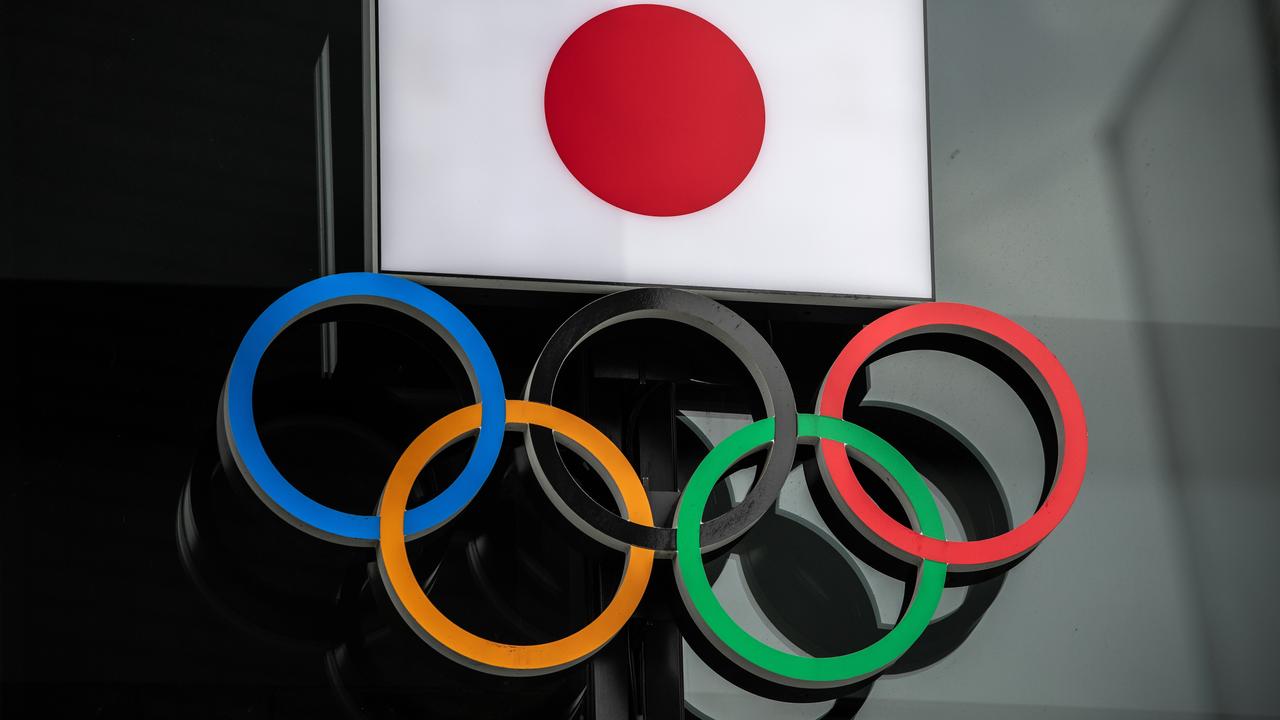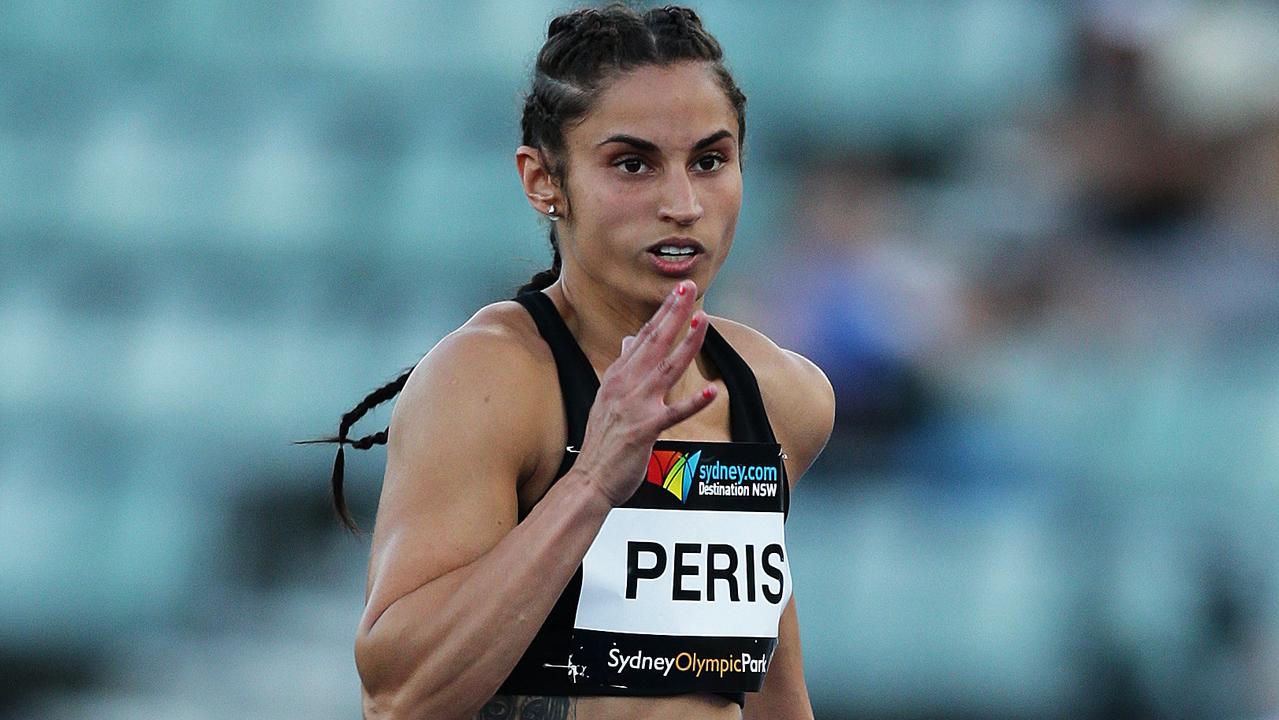Sydney Olympics 2000: Gary Hall Jr still hates Australian public
He was famously mocked by Australia’s golden relay side with the “smash ‘em like guitars” celebration but American villain Gary Hall Jr’s beef isn’t with the four men who beat him that night.
Olympics
Don't miss out on the headlines from Olympics. Followed categories will be added to My News.
Gary Hall Jr made his peace with the Australian relay team that he vowed to smash like guitars at the 2000 Sydney Olympics long ago.
The first to congratulate the victors, the flamboyant American partied with the Australians who beat him for the gold then mocked him on the pool deck before he left Sydney 20 years ago.
He’s struck up lifelong friendships with his rivals but still hasn’t forgiven the Australian media for portraying him as the fall guy in America’s defeat.
Two decades later, he is still refusing to talk to the press about the race, telling News Corp Australia: “I haven’t spoken to Australian media since Sydney. It was unfair what they did to me.
Kayo is your ticket to the best sport streaming Live & On-Demand. New to Kayo? Get your 14-day free trial & start streaming instantly >
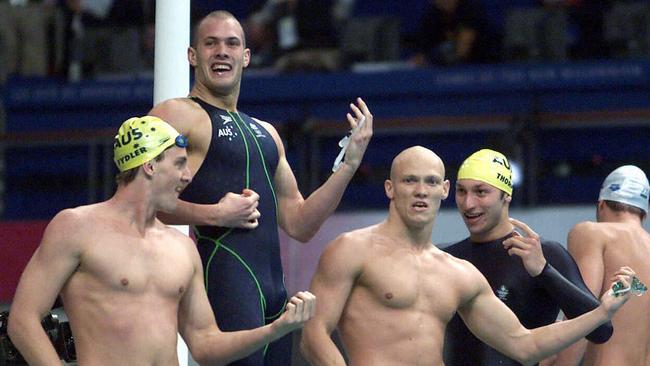
“I’ve nothing but respect for the members of the AUS relay. I respectfully decline comment.”
While Australia’s triumphant swimmers famously teased Hall by strumming air guitars as they celebrated their historic win, they have never considered Hall to be the archvillain after his cocky prediction blew up in his face.
“Gary is a very gracious character and none of us have a bad word to say about him,” Thorpe said.
“He was the first to congratulate us and after we finished competing, he came out and celebrated with us so he shouldn’t be characterised as a bad guy, because he’s a good guy.”
SYDNEY OLYMPICS 20 YEARS ON
Sydney Olympics 2000: Where are Australia’s gold medal winners now?
Sydney Olympics: The unbelievable secret plans that won the officials over
2000 Olympics: Cauldron lit 20 years after historic Games
Olympic boss John Coates pays tribute to John Fahey who helped bring the Games to Sydney
A five-time Olympic gold medallist, Hall is as well known for his antics out of the water as his many achievements in the pool. He was once suspended for testing positive for marijuana and was also fined for wearing a robe and shadow boxing before an Olympic final.
His tongue in cheek comments about how the Americans would smash the Australians like guitars were actually intended to be a plug for Gibson guitars – who were sponsoring him at the time – but made him public enemy No. 1 in Australia.
“You couldn’t really miss it because it was on the front page. That’s how we found out about it, like everybody else,” Klim said.
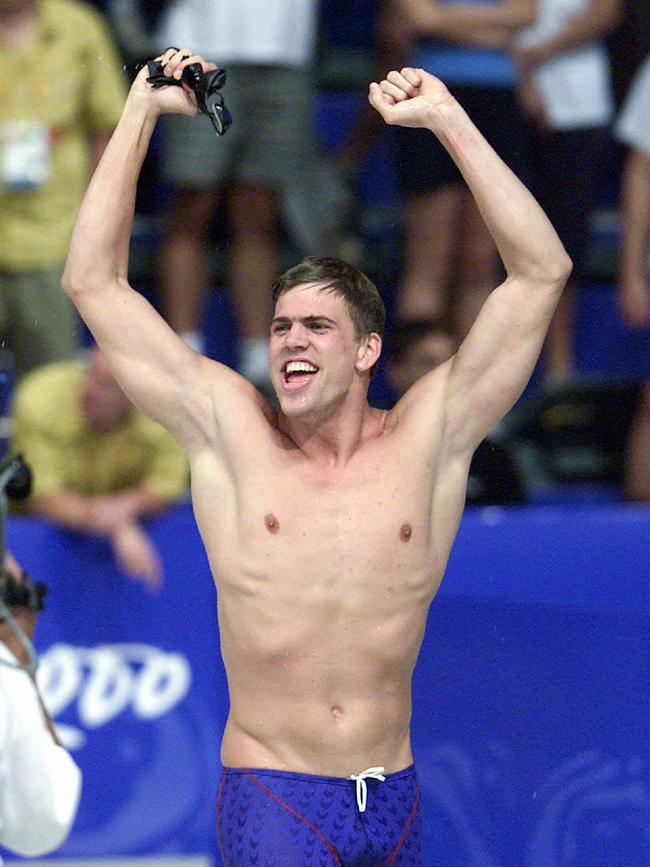
“He always tends to create some sort of atmosphere around his races and he thrives on it. But to be honest we didn’t need any more motivation.
“We didn’t use that comment to fire us up but it was in the back of our minds and when Chris (Fydler) encouraged us after the race to do a little bit of air guitar, it didn’t take very long and we were pretty keen to get into it.”
Klim first raced against Hall at the 1996 Atlanta Olympics and the pair have gone on to become good mates and often talk about the relay in Sydney.
“I’ve had a chance to talk to him since then and get his thoughts on it and he actually feels that he’s got some regrets because that comment was taken out of context a little bit,” Klim said.
“He’s got a lot of respect for Aussie swimmers and he talks about that event very fondly because obviously it just brought out the best in everybody and it’s just unfortunate that he’s been made out to be the villain in this because he was a great sport about it and the first to shake our hands.”
Revealed: How Thorpe nearly cost us our greatest gold
The celebrations were already in full swing after Australia’s historic victory in the men’s 4x100m freestyle relay at the Sydney Olympics when the four swimmers who had teamed up to win the gold suddenly had a sinking feeling.
Michael Klim, Chris Fydler, Ashley Callus and Ian Thorpe had perfectly executed their masterplan to beat the Americans but in the euphoria that followed, they began to fear the worst.
Caught up in all the excitement, Thorpe spontaneously hoisted himself out of the water to join his teammates on the pool deck the moment he got his hands on the wall before his American rival Gary Hall Jr.
He had left the water before the last placed team had finished the race – potentially breaching one of swimming’s oldest technical rules – and Klim was nervous.

“We probably would have actually got disqualified because we pulled Thorpey out of the pool just behind the blocks,” Klim said.
“He didn’t exit the pool as you’re supposed to, but I think there would have been a third world war if we got disqualified.”
Thorpe and Fydler were also nervous, but for a different reason.
To beat the U.S. – who were faster on paper – the Australians had to make up as much time as they could on the changeovers but it was a risky strategy because if anyone went a fraction early, the team would be disqualified.
They had all cut it fine but Thorpe’s mind was playing tricks on him when the scoreboard blacked out and the judges began reviewing the tape before posting the official results.
“I jumped out of the pool pretty quickly but the results still have to be officiated so you never know,” Thorpe said.
“We get the relay changeovers down to such a fine art so every swimmer in the team would have been worried.”
Less than a minute later, the official results were revealed.
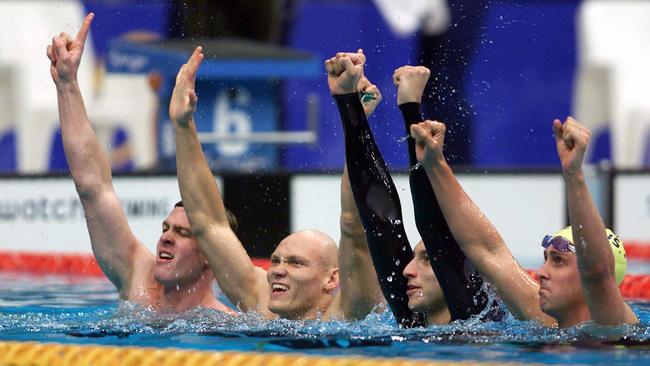
That old rule preventing swimmers from leaving the pool early had been scrapped before Sydney and the Australian changeovers had been perfect.
Australia had won the gold, setting off a fresh wave of celebrations.
“There’s always that nag but fortunately it came up pretty quickly,” Fydler said.
“Then it was pandemonium. We just went crazy … and we celebrated appropriately.”
That race – on the first night of competition at the Sydney Olympics – is now part of Australian sporting folklore but the terrifying anxiety the four swimmers went through at the end underlines the fine line they had to tread to get the gold.
Klim, racing against Anthony Ervin, gave the Australians the perfect start when he broke Alexander Popov’s individual 100m world record on the opening leg, stopping the clock at 48.18 seconds, though he didn’t realise straight away.
“I did have a feeling I was going pretty quick but everything happened so quickly when I touched the wall,” Klim said.
“I couldn’t tell because my vision’s not great but I had both Chris and Ian confirm that it was a world record and Alex gave me a nod from across the lane.”
Fydler swam the second leg. The oldest member of the relay competing at his third and final Olympics, he had a surprise in store for the Americans.
Master coach Doug Frost, who was put in charge of the Australian relay team, had been studying the American’s split times closely and devised a strategy he thought could win against a team that was faster on the clock.
“The Yanks are always fast but they go out hard and don’t finish as strong so I told our guys not to spin the wheels and they’ll get them at the end,” Frost said.
“That’s the thing about swimming, races aren’t won at the turn, they’re won at the wall.”
In swimming’s equivalent of Muhammad Ali’s rope-a-dope knockout of George Foreman, Fydler was told to ease off on his first lap to encourage his opponent Neil Walker to push hard early and take the lead.
Then Fydler made his move on the second lap, powering past Walker to maintain Australia’s advantage at the halfway mark.
“The reason we won that race was not because we had the fastest swimmers but because all four of us, each in our own ways, we swam perfectly,” Fydler said.
“I felt very comfortable from the first stroke but I was really just concentrating on setting it up for the turn so in that last 25m, I was able to just empty the tank.”
MORE OLYMPICS
Olympic stars: The golden generation of kids inspired by Sydney 2000
2000 Olympics: Cauldron lit 20 years after historic Games
Terry Carr: Surprise for former Sydney Olympic volunteer after his image was chosen for banner
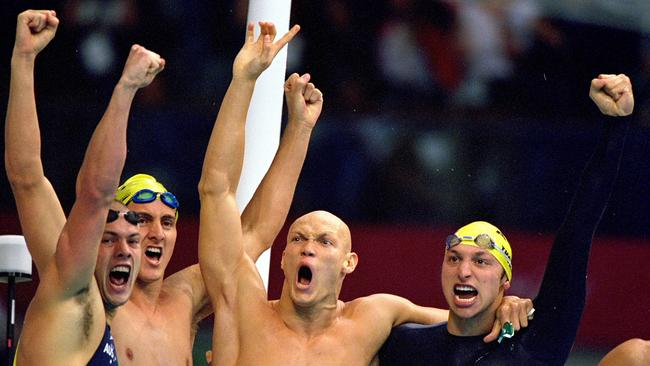
Callus, competing at his first Olympics, sealed his place in the final after a shootout with Todd Pearson and Adam Pine in the morning heats and was sent in against Jason Lezak, America’s greatest relay swimmer, adopting the same strategy Frost gave to Fydler.
“Lezak was a big bugger and he reeled me in really quickly,” Callus said.
“Coming out of the turn, I just dropped the hammer on my legs and said ‘let’s go’.
“Big guys like Lezak tend to tire pretty quickly and I knew that I had plenty to go so I just upped my stroke rate and went as hard as I could and gave us a very skinny lead which was just enough at the end.”
Few people gave Thorpe much hope of holding off Hall on the anchor leg. The American was a sprint specialist and Thorpe, just 17 at the time, had already won the 400m gold earlier in the night and almost missed the relay because the zip on his bodysuit broke.
Hall sailed straight past him and was comfortably in front when they turned for home but Thorpe had plenty in reserve.
“The American team were blindsided by what we were doing. They like to lead at every part of the race, they have the same strategy at every Olympics, so we knew how to swim to put them off,” Thorpe said.
“I always knew I was going to be behind but I was amazed at how quickly it happened but at the 50m mark, I actually had a really good turn and it was the first time I hadn’t lost any ground so I knew it was back in the race.”
It was only in the final few strokes that Thorpe got past Hall, getting his hand on the wall first by just 0.19 seconds, but enough to win the gold and break the world record.
“I tell people in sport if you generally love sport go for the champion because the amount of pressure is considerable compared to that of the underdog,” Thorpe said.
“If you like gambling go for the underdog because they’re going through a lot less than the champion is to get there.
“We had both up against us, we weren’t as fast as the Americans but the expectation was that we were.”
Originally published as Sydney Olympics 2000: Gary Hall Jr still hates Australian public


